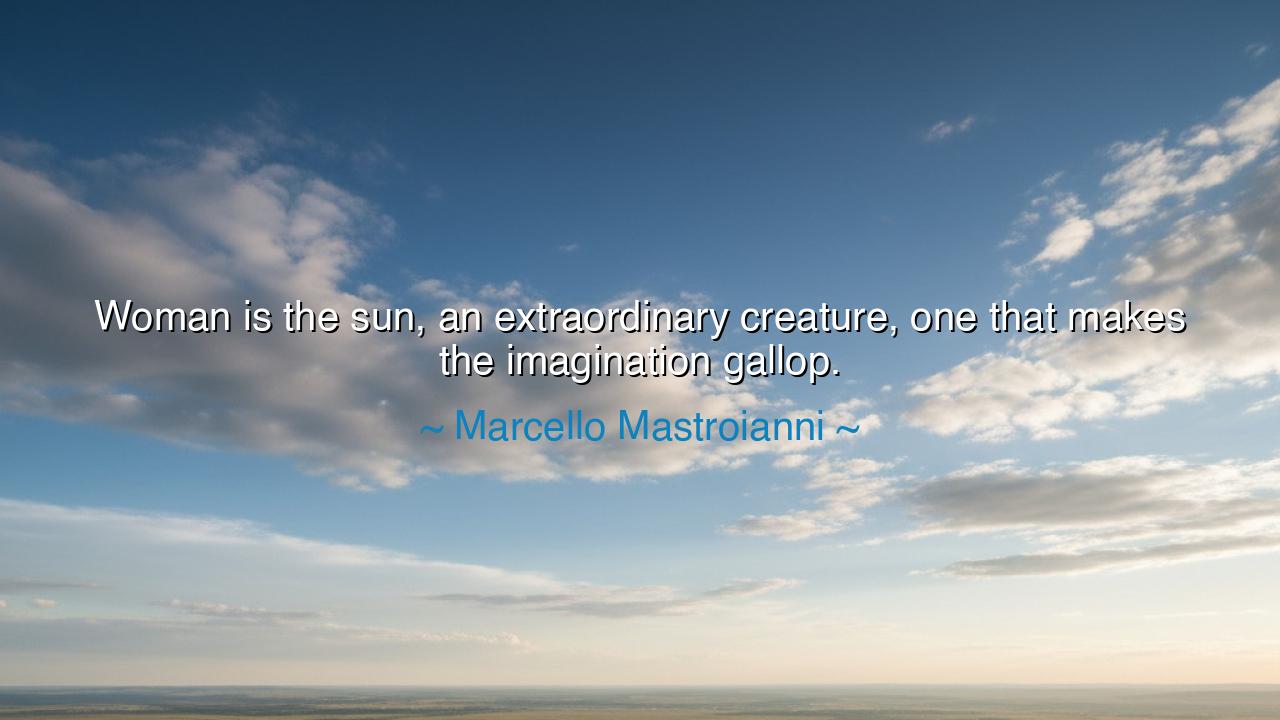
Woman is the sun, an extraordinary creature, one that makes the






“Woman is the sun, an extraordinary creature, one that makes the imagination gallop.” Thus spoke Marcello Mastroianni, the luminous star of Italian cinema, whose art captured both the passion and the mystery of human longing. His words, poetic and reverent, are not a mere compliment to beauty, but a hymn to the sacred power of the feminine spirit — that radiant force which inspires, nurtures, and ignites the very imagination of humankind. In this brief yet profound saying, Mastroianni gives voice to an ancient truth: that woman is not a shadow of man, but the sun, the very source of light and life itself.
The sun has long been a symbol of vitality, warmth, and creation — and to call woman by that name is to recognize her as the center of all being. Mastroianni, who moved through the world of art and cinema like a philosopher cloaked in elegance, understood that the feminine is not merely a form of beauty but a source of vision. In every culture and age, the presence of women has kindled the fires of poetry, invention, and courage. To encounter her — in her strength, in her mystery, in her tenderness — is to awaken the imagination, that divine power which allows mortals to reach toward the eternal. She makes the mind gallop because she is life in motion: untamable, luminous, and endlessly new.
We can see this truth reflected throughout the ages. Consider Leonardo da Vinci’s Mona Lisa, that timeless face whose smile has bewitched centuries. Scholars have written volumes, philosophers have pondered, and artists have despaired of capturing what lies behind her gaze. Yet what is this fascination if not the galloping of the imagination before the mystery of the feminine? Leonardo did not merely paint a woman; he captured an aspect of the sun, the living source of wonder that animates art and thought alike. Through her, he touched the infinite.
In another age, the poet Dante Alighieri found in Beatrice the guiding light that led him from the darkness of sin into the celestial vision of Paradiso. She was not merely a mortal woman in his eyes, but an embodiment of the divine — the sun that illuminated the path to salvation. Such stories remind us that throughout human history, the feminine principle has been a force not of submission, but of illumination. It is she who gives birth not only to life but to wisdom, love, and art. Mastroianni, standing within a world of cinema where woman was often seen as muse, dared to name her instead as creator, the one who makes the imagination gallop toward meaning itself.
Yet, this quote is not only about woman as muse — it is about the power of admiration, the sacred recognition of beauty and strength in another soul. The sun shines not to be worshiped, but to give light; so too, Mastroianni’s words remind us that to honor woman is to honor the creative power of existence. Every civilization that has diminished her has grown cold and dim, while those that have celebrated her light — as Egypt did with Isis, as Japan did with Amaterasu, as Ireland did with Brigid — have flourished in art, spirituality, and renewal. The imagination cannot gallop in darkness; it needs the warmth of the sun to move.
And what of our own lives? To see woman as the sun is not merely to praise her beauty, but to recognize the source of energy she represents — in mothers, sisters, lovers, and daughters; in thinkers, builders, dreamers, and leaders. She is the creative counterpart in all of us — the part that feels, that envisions, that gives without losing. The world that learns to honor the feminine in all its forms will rediscover its balance. For every heart carries both the sun and the seed; both the radiance that gives and the soil that receives.
So let this be your lesson: honor the light that gives life. Do not dim it with judgment, nor cage it with fear. When you see the extraordinary in others — in their grace, courage, and tenderness — let your imagination gallop toward wonder, not possession. Celebrate the feminine not as an object of admiration, but as the source of creation, the sacred power that keeps the world alive.
For as Mastroianni reminds us, the woman — and through her, the feminine essence within all humanity — is the sun: the heart of existence, the fire of inspiration, and the eternal invitation to dream. Without her light, the imagination falls asleep; but in her presence, it soars — radiant, wild, and free.






AAdministratorAdministrator
Welcome, honored guests. Please leave a comment, we will respond soon